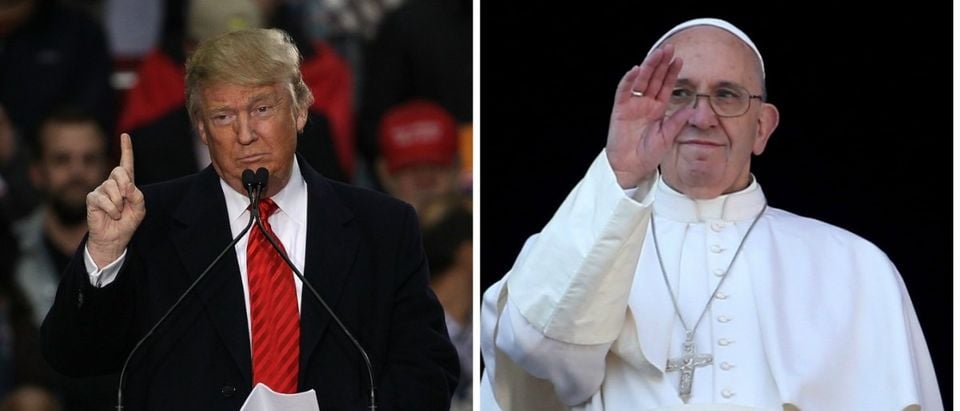Catholics are Christians the last time I checked but recently the Holy Father claimed, “A person, who thinks only about building walls, wherever they may be, and not building bridges, is not Christian.” This slight was obviously directed at Donald Trump, but also offended many Catholics in the U.S. The Pontiff, when asked if he was telling Catholics who to vote for, replied in part, “I am not going to get involved in that. I say only that this man is not Christian if he says things like that.”
Given that his remarks came after celebrating Mass near the border — something George Weigel said threatened to “turn the Mass into an act of essentially political theater” when U.S. bishops did it two years ago — it sounds like Papa is pretty involved in our immigration discussion.
Surely the Pope hasn’t forgotten the Great Siege of Malta and the importance of walls during this holy war between the Ottomans the Knights of St. John (representing the Christians of Europe). Jean Parisot de la Valette, the Grand Master of the Knights, having anticipated a siege for years, wisely fortified walls and constructed a third fort. This historical siege in the defense of Christendom turned the tides of Muslim expansion in 16th century Europe. Queen Elizabeth I of England wrote during this four month-long battle, “If the Turks should prevail against the Isle of Malta, it is uncertain what further peril might follow to the rest of Christendom.” This defense of Christian civilization was conducted on walls.
The previous big battle to defend Christendom, The Siege of Vienna in 1529, was the first attempt by the Ottomans to conquer the city. The citizens of Austria brought in a mercenary from Germany named Nicholas, Count of Salm. He fortified the 300 year-old walls and blocked the city gates in preparation of the siege. The Ottomans failed to breach the newly-strengthened barriers an
Before Christ’s Ascension, he commissioned all believers to “make disciples of all nations.” The last recorded words of the Savior to his disciples in the Gospel of Matthew hold great significance to Christians. The key word in this section of Scripture, known as the Great Commission, is “nations,” which are defined by the boundaries between them. If we have open or unsecured borders then we would not have any nation to speak of.
The Church has recognized the principle of self determination for both individuals and nations, as well as the right of nations to control their borders. His Holiness understands free will and he uses his quite freely to denounce capitalism whenever he can. However, it is one thing to oppose capitalism’s excesses, quite another to promote socialism. Capitalism, not Socialism, has lifted billions out of poverty and is the most moral of economic systems around the world. I personally prefer Pope John Paul II’s view of a “market economy,” or, “an economic system which recognizes the fundamental and positive role of business, the market, private property and the resulting responsibility for the means of production, as well as free human creativity in the economic sector … circumscribed within a strong juridical framework which places it at the service of human freedom in its totality.”
It’s ironic that many of the immigrants that Pope Francis is concerned about are fleeing the economic catastrophes inflicted by left-wing governments with views similar to the liberation theology the Holy Father has tried to rehabilitate. In their statement of principles pertaining to immigration reform, the U.S. Catholic Bishops exhort Congress to “examine the root causes of migration … The antidote to the problem of illegal immigration is sustainable economic development in sending countries.” The first step in doing that should be to turn away from economic policies that immiserate their people and cause them to leave.
Latin America may be in the process of doing that. The Peronist party to which Pope Francis has close ties in Argentina was thrown out of office this year, and left-wing governments in Brazil and Venezuela are under serious threat. On a very basic level, it’s easier for the him to opine about American immigration policy than to confront the fact that his economic views are quickly losing legitimacy on his home continent.
Borders, walls and enforcement technology are the physical infrastructure of immigration laws, and since most estimates hold that 11 million illegal immigrants are currently here, it’s reasonable to think we don’t have enough. Unregulated, mass immigration contributes to economic and cultural chaos. If that chaos and resulting strain on the social safety net is a cost — even a sacrifice — that Pope Francis expects the American people to make, that would be arguable, but understandable. But none of his comments indicate that he is aware there are any costs to taking in millions of illegal immigrants.
Why did the Pope take the bait on this loaded immigration question, anyway? Shouldn’t he reserve his ire for an ostensibly Catholic country like Cuba, whose citizens are still barred from leaving by its communist government?
Il Papa could also train his gimlet eye on the plight of gays in Islamic lands, children in Africa and Socialist kleptocracies that keep much of Latin America impoverished. Those are true tragedies that could use the Pope’s moral authority and strong voice.
As a practicing Catholic, I assure you that I consider myself a Christian. A Christian that believes in border security. Is the Pope not a Christian because he lives behind massive walls in Vatican City? Pope Francis, tear down those walls! And build a few bridges, preferably drawbridges over moats — just in case daesh decides to visit. Viva il Papa.


